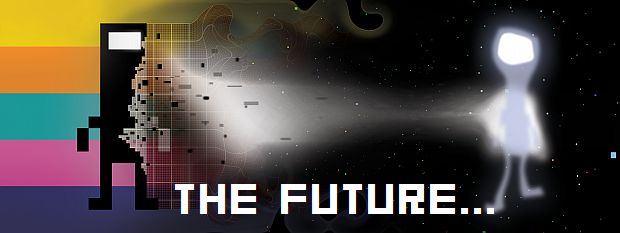If you’ve been following along our week long series on Gaijin Games, the studio behind the BIT.TRIP series for the Wii, you know that they have an interesting story to tell about how they came to be. Of course, for every creation story someone could tell, there is an equal story about the dreams and ambitions for the future. That is where we are today.
Talking to the three devs from Gaijin Games, we final reached this point in out round table about two hours into discussion, and it was interesting to see where they see themselves in a few years time. It is clear, yes, that they are talented and inspired, and they are well aware of this fact. And it is really refreshing to see three guys who aim within their bounds, a group of people who see what three people can actually create, and create well. There’s not much bullsh***ing with Gaijin.
However, they are only three guys. This isn’t going to stop them, however. As Man-in-Charge Alex Neuse says, “I want to see more stuff that inspires creativity in human beings.” That’s a pretty damn impressive goal to make for the future, one which if you follow the jump you can understand even more.
To begin talking about the future, we have to start with the immediates. After all, they are a company made up of only three guys. Neuse makes it clear however, what they will not be doing. “I will say first and foremost that Gaijin Games is not a BIT.TRIP studio” he says, “It’s not a retro gaming studio that will do retro games forever.”
That is not to say that their little mascot, CommanderVideo from the BIT.TRIP games will be going AWOL once the sixth BIT.TRIP game is completed. Chris Osborn, the engineer for the team, said that “You are going to see him in places where you are not seeing him right now,” while jokingly mentioning muffin tins, toilet paper and Saturday Morning cartoons as all potential CommanderVideo products. In all seriousness, he was clear that “We are never going to whore out the IP,” and that whatever CommanderVideo shows up in will be appropriate to the BIT.TRIP universe.

Actually, the direction he hopes to take with the company is one that makes plenty of varied and hook-driven games, with the word “unique” being tossed around a lot. Actually, Alex and the rest really hope to surprise their fans, with more than just BIT.TRIP games. Expect to “continue seeing very beautiful elegant charming games from Gaijin Games for a very long time,” says art designer Mike Roush, but as the team slowly grows (don’t expect Gaijin Games to ever be a huge studio), they hope to pull off more varied genres of games.
Alex is clear he would love to go back and make a large epic game like he did with LucasArts, but, as he says “We make a move when it is appropriate and it is thought out, and we won’t do a feature in a game or we won’t make a company move that we can’t do well, or will jeopardize the company.” They know their abilities, and they know what they can pull off as a studio. It might be a while, but for now they are working on a few smaller, aesthetically beautiful games, with BIT.TRIP Void being only one example.
It was after this point in our discussion that the future of Gaijin turned to the future of the industry as a whole. Things have changed, where much like anyone can create a movie if they should like, anyone can create a game if they would like. Technology has reached a point where studios are able to create epic blockbuster titles, as well as small indie games. It’s a brave new world in game development, and I asked them about this.

“I think we’ve entered a Renaissance of sorts in the videogame industry,” says Alex, pointing out that how development is done is so different than how they were done just five years ago. “The barriers of entry right now are less daunting then they ever have been, and I hope that they continue to become less and less.”
Of course, there are still plenty of benefits to being an actual studio, such as becoming licensed developers for all of the three consoles, which Gaijin Games currently is. We started discussing all the new peripherals coming out, with the new PlayStation controller, Project Natal, as well as MotionPlus and everything else. It was surprising to hear that the new product, at least for Chris, that was most interesting is the Wii Vitality Sensor. “There is no other device like it,” he says, rattling off a few ideas he’d like to see, such as survival horror games.
It’s actually this forward thinking that drives this team ahead. While they cannot necessarily get hold of all these new forms of interaction right away, it is obvious that it still doesn’t stop them from dreaming about what could be. And what could not be. None of these guys are interested in creating products that others have made. They mentioned that they could make a really great game that is a whole lot like Need for Speed for example, but no matter how good that game is, it still would be just a racing game.

For these guys, it’s less about making something epic beyond belief, but about working within the confines of a limited space, whether it’s the power of the console, or the size of the team, or how much money they have to use. Rather it’s a challenge to make something special and unique, something that has never been seen before.
“I’m less and less impressed with gray space marines shooting gray aliens in a gray environments. Enough with the teethy aliens,” says Alex, “I want to see more stuff that inspires creativity in human beings.” Make it happen, Gaijin Games. Make it happen.


